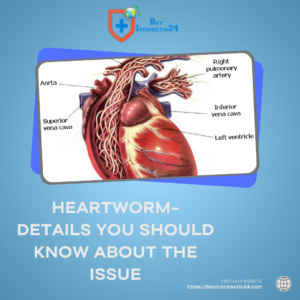Understanding Heartworm Disease: Causes, Risks, and Treatment
Introduction
Heartworm disease is a serious and potentially fatal condition caused by the parasite Dirofilaria immitis, which primarily affects dogs but can also infect cats and other mammals. Transmitted through mosquito bites, heartworms live in the heart, lungs, and associated blood vessels, leading to severe organ damage. Early diagnosis and treatment are crucial to preventing complications [American Heartworm Society ].
What Is Heartworm Disease?
Heartworm disease is a parasitic infection where adult worms reside in the heart and pulmonary arteries, causing inflammation and reduced blood flow. Over time, this can result in heart failure and lung disease. It is most common in warm, humid regions where mosquitoes thrive [CDC – Heartworm ].
Uses & Benefits of Prevention
Preventing heartworm disease is the best approach to safeguarding pets’ health. Preventatives are highly effective and backed by scientific research. Key benefits include:
- Avoiding life-threatening complications – Prevention eliminates the risk of heart and lung damage caused by adult heartworms.
- Cost-effectiveness – Preventative medications are significantly cheaper and safer than treatment for an existing infection.
- Easier management – Monthly treatments are simple to administer compared to the complex and risky process of curing heartworm disease [FDA – Heartworm Prevention ].
Mechanism of Action
Heartworm preventatives work by eliminating Dirofilaria immitis larvae before they mature into adult worms. Common active ingredients include:
- Ivermectin, Milbemycin, and Moxidectin – These medications disrupt larval development, preventing heartworm formation.
- Selamectin – Used in topical applications, it kills both heartworm larvae and external parasites like fleas and mites [PubMed – Heartworm Prevention].
Side Effects & Risks
While heartworm preventatives are generally safe, potential side effects may include:
- Mild reactions – Vomiting, diarrhea, or temporary lethargy.
- Allergic responses – Swelling, itching, or difficulty breathing (rare but serious).
- Neurological effects – Dogs with the MDR1 gene mutation (e.g., Collies) may be sensitive to certain medications and require vet guidance [NIH – Heartworm Disease ].
In contrast, untreated heartworm infections pose severe risks, including heart failure, lung disease, and death.
Dosing & Administration
- Monthly preventatives – Administered orally or topically, based on weight and vet recommendations.
- Injections – Prolonged protection (up to six months) is available for certain pets.
- Consultation required – A veterinarian must determine the appropriate dosage based on the pet’s health and risk factors [AVMA – Heartworm Disease ].
Controversies & Misconceptions
- “Indoor pets don’t need preventatives” – Mosquitoes can enter homes, putting all pets at risk.
- “Heartworm is only found in warm climates” – Climate changes have expanded the disease’s geographical range.
- “Home remedies work” – No natural or over-the-counter treatments are proven effective; prescription medication is necessary [CDC – Heartworm Myths ].
Conclusion
Heartworm disease is a life-threatening but entirely preventable condition. Monthly preventatives, regular veterinary visits, and mosquito control are essential in keeping pets safe. If heartworm infection is suspected, immediate veterinary care is crucial.
For more information, refer to trusted sources such as the American Heartworm Society , CDC , and FDA .


Good article.
Thanks for the post!